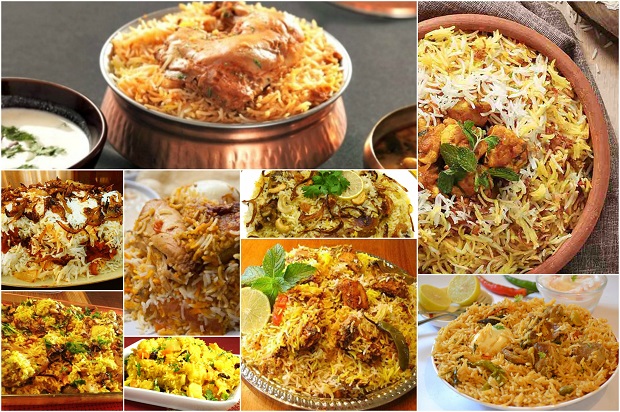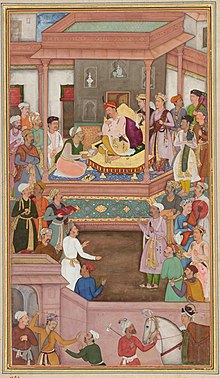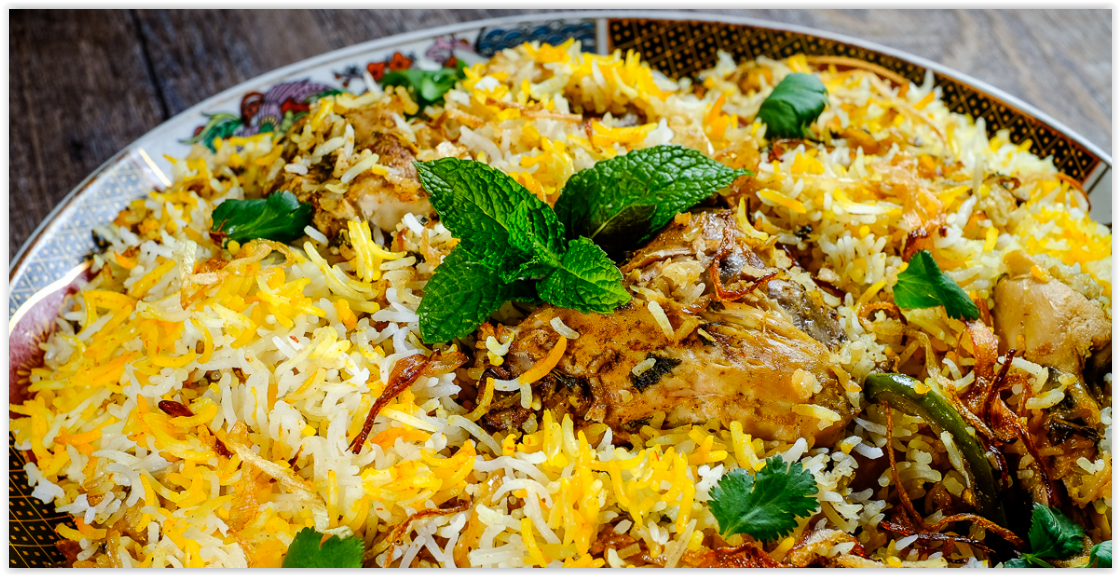Biryani is a rice dish from the Indian subcontinent that is delicious. A well-made biryani is a symphony of flavor, with a melody of distinctive spices and a harmony of perfectly textured cooked rice and meat. In my personal experience, it’s a difficult dish to prepare correctly, such that no spice or scent overpowers the whole, the rice is done just right, and the meat is juicy and tender. If all of this is completely foreign to you, I probably can’t say more to describe what has to be one of my favorite Indian dishes, you just have to try it, preferably before reading the rest of this. In any case, as I was eating biryani for the first time in a while, I became curious about its history. I suppose my mind was also fixated on current events and that thought process led me to reflect on how society so many years ago is so different yet still plagued by the same hateful tendencies. I’m an optimistic person when it comes to these things and most people would probably agree significant progress has been made in the past 500 years, 1000 years, 2000 years- but somehow the ideologies fueling hate in those eras linger on, perhaps more subtly but very much alive.
First, I want to summarize my thoughts about some current events. For a long time I felt almost that “it goes without saying” that statements like “Black Lives Matter” are true and that the sentiment behind them are justified. After a high school education where I was fortunate to have fantastic, aware teachers on these issues, it felt to me that the fact that African-Americans were systematically at a disadvantage was, just that- fact, supported by almost every kind of possible data from income to incarceration to education. But, I suppose if I were asked about it back then in 2016, I would have honestly said that I thought that racial issues were on the mend, that I genuinely believed most Americans would agree that race is something that doesn’t affect their day-to-day or linger at the forefront of their thoughts. Those beliefs perhaps were reinforced by successful African-Americans that I’d seen as a child: the first black US President and a number of black Congresspersons and other politicians that marked progress for representational issues, famous black sportspersons and singers that demonstrated a decreasing racial wealth and opportunity gap, and black professionals that lived in my prosperous community who, from my perspective at the time, lived a life as comfortable as mine. Yet, the past four years have seen overt xenophobia, nationalism, and racism experience a sickening resurgence not just in America but all over the world. Four years on, I see that racial hate and discrimination are far more deeply entrenched than I’d earlier thought, and that I was wrong back then. And I think that’s the main purpose of a movement like Black Lives Matter- even if you personally don’t have prejudice against a group of people, it’s not enough to just advertise that and sit back and then say you care about someone in that group- because if you’re not fighting for them in any way, even if it’s fighting the prejudice in yourself, do you care? That’s why focusing on things like whether kneeling for the flag is a respectful protest are dismissive. One of my friends raised a point that many people might simply be posting or donating to avoid social faux-pas as opposed to a more genuine empathy and outrage, which I think is a fair question- can ingrained racial biases shrink irreversibly if, in the age of social media, one acts through peer pressure rather than legitimate self-determination? Another friend mentioned that social media in particular is beneficial even as a way to disseminate information and raise awareness- that whatever the true source of action, the act in itself may be helpful to someone in some way and thus beneficial in the utilitarian sense. I’m not sure I can answer I do think that if absolutely nothing else, anyone who lives in our country should introspect about their attitudes on race (or any form of discrimination, really), and if they can, support through protest, donation, or a variety of other ways. I myself cannot claim to be some exemplar of this movement, but I have been challenging myself and those near me to notice and attack the (sometimes subtle) discrimination that all varieties of minorities can face.
Like the US, India is a country of remarkable diversity. First, as those familiar with Indian history know, India has seen a great deal of bloodshed between its two largest religious groups, Hindus and Muslims. The original religion-based partition that formed India and Pakistan itself resulted in numerous conflicts between the nations. Politicians in both nations have historically used their religion to instigate violence, at times openly. More recently, while the Indian government is secular by law, the current BJP administration is quite blatantly anti-Muslim. I’m honestly not educated on these topics enough to compare them with sufficient nuance, but as an Indian-American, the parallels between race in America and religion in India appear numerous to me, and the waves of violence in both nations against minorities are spearheaded by the political leaders representing them in Donald Trump and Narendra Modi. On a more pleasant pivot, there’s a mostly peaceful cultural divide in India between North and South. In the north, Indians speak Indo-Aryan languages, while South Indians speak Dravidian ones. The ethnic groups that live in the North and South of India wear distinct clothes and have different holidays. Indeed, I’d would argue that the US North and South are far closer in culture than the Indian North and South. This geographic division is certainly not as confrontational as the religious one, but it’s another element of the cultural mosaic that is modern India.
 Biriyanis from many different places
Biriyanis from many different places
So what does all of India’s diversity have to do with biryani? To explain, I should mention that the origin of biryani is debated- one story attributes it to the Mughal army, another to Arab traders- while the specific origin is hard to know for sure, it is certain that biryani was invented by Muslims, sometime during the early Mughal dynasty. The dish very quickly became very popular, and over time, many localities in the Indian subcontinent developed their own version of the delicacy. Kolkata’s biryani has potato, Hyderabad’s has more saffron, and Lucknow’s has mutton cooked in ghee. Therefore, to me, biryani is in some sense a unifying force in the Indian experience- when you meet an Indian Muslim or Hindu, North Indian or South, you can bet they like biryani. Furthermore, despite its variety in preparation, biryani is recognizable in each of it’s local forms. But the extension doesn’t stop there: biryani is also popular in Pakistan, Afghanistan, Bangladesh, Sri Lanka, and Myanmar! I know I sound like a car salesman describing biryani, but think about that- this food is present in the cultures of almost a quarter of the world’s population. I acknowledge it’s an egregious oversimplification to group almost 2 billion people on the basis of one food, but to me it’s also something of a statement on the scale of cultural diffusion through civilization that we, in the 21st century, are so lucky to enjoy.
The popularity of biryani therefore embodies a larger story of celebrating diversity. Some of the greatest Mughals formed their empire based upon principles of religious toleration. The most legendary Mughal ruler was the third emperor Akbar, who went as far as to create a syncretic religion called Din-i-Ilahi. Though I don’t mean to imply that Mughal India as a whole always exemplified religious toleration (it did not), it’s fascinating that Akbar succeeded in unifying his diverse empire with ideas that were extremely liberal at the time: they not only blended Indian and Persian cultures but also changed the united Mughal culture for the better. Akbar governed in a secular manner and celebrated all faiths, including smaller minorities like Sikhs and Jains. The Mughal empire under Akbar tripled in size and wealth and his administration saw flourishing arts. In short, Akbar exhibited an honest reverence for all of his subjects’ faiths and cultures that translated to prosperity for everyone- he won the trust of his subjects while being a heretic to some and a radical to all. But that was 450 years ago, and the ideas that were so radical then shouldn’t be now. By attacking the differences between us, poor leadership takes attention away from important issues that in 2020 we all need to be working together to solve, like the economic impact of COVID-19 and climate change.
 Akbar’s ideologically diverse court
Akbar’s ideologically diverse court
Societally it’s not sensible to embrace contributions like biryani from minorities without embracing their source. That’s not to say that one should embrace a group of people solely for one cultural feature- rather, that we are fortunate to benefit from unprecedented cultural interconnectedness to begin with, and yes- for those who find themselves with biases or hate now, a good starting point may be to consciously appreciate similar positive contributions and then acknowledge the contradiction in their discriminatory convictions. Humankind is like a biryani in that we are only successful through diverse elements that coexist to form something wonderful- not easy to form, but the end result is always more than the sum of its parts.
